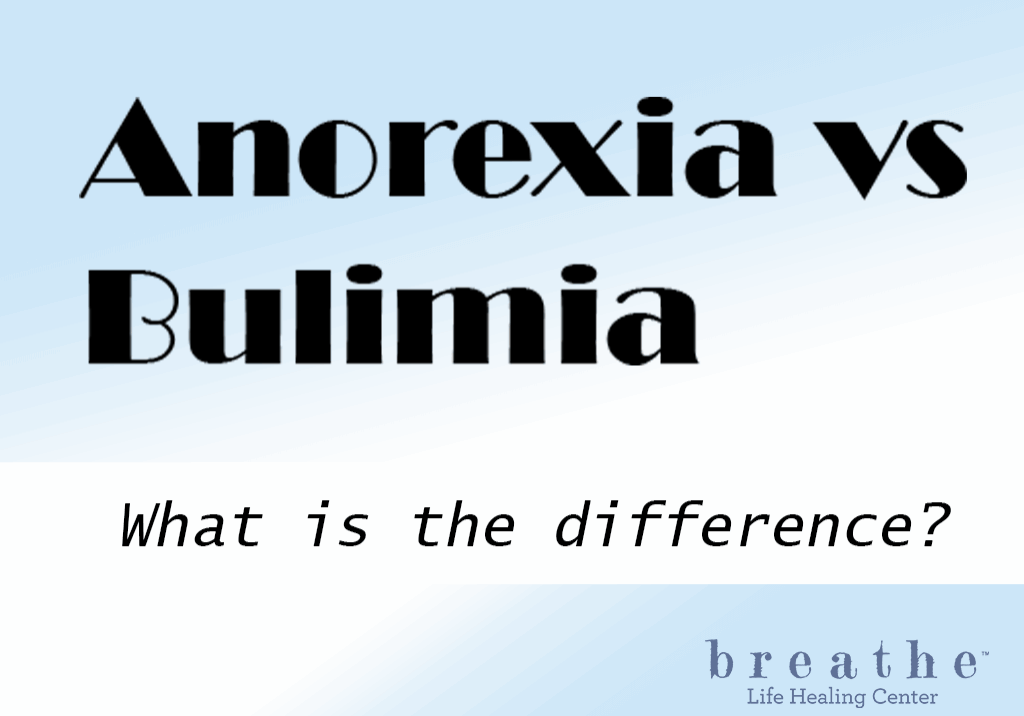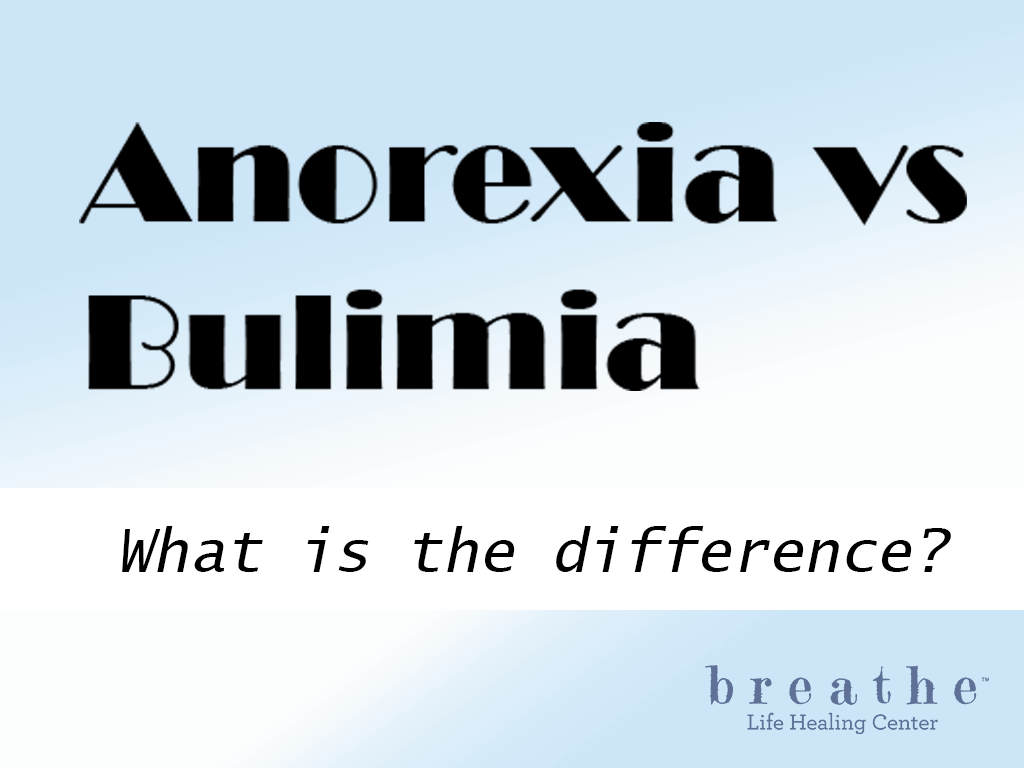Anorexia Versus Bulimia

In this article we cover you will learn the difference between Anorexia and Bulimia, what their main symptoms are and possible treatments.
Let’s get started.
What is Anorexia

Anorexia Nervosa or better known as “anorexia” is a debilitating disorder that causes someone to obsess and worry about their weight to the point of destruction. It is described as someone who is at abnormally low body weight, has a severe fear of gaining weight and has an improper perception of their body or how they look. People suffering from anorexia will go to extreme measures in order to lose weight or maintain their slim figure.
Anorexia causes people to severely restrict their calories to lose weight. They may use purging, diet aids, diuretics, laxatives or enemas after consuming meals to reduce the number of calories that they have.
Symptoms
Anorexia usually manifests as a severe loss of calories and obsession with losing weight. Some of the most common symptoms of anorexia include:
- Self-esteem is based upon appearance and looks
- Dizziness or fainting
- Loss of hair
- Loss of period
- Difficulty sleeping
- Terrified and worried about gaining weight
- Dehydration
- Constipation
- Irregular heartbeat
- Swollen arms or legs
- Denying hunger cues and pretending to not be hungry
- Constantly checking self in the mirror
Warning Signs
- Complaining about being “fat”
- Adamant about maintaining a strict exercise routine
- Not eating in public or in front of others
- Lying about how much food you’ve had to eat
- Refusing to eat specific food groups such as carbohydrates or sugars
- Layering your clothes to cover up weight loss
What is Bulimia
Bulimia Nervosa also referred to as “Bulimia” is an eating disorder that is serious and potentially life-threatening. People with bulimia often binge in secret and then purge or use other unhealthy methods to get rid of the calories they have consumed.
People with bulimia use different methods to lose the calories that they have consumed such as diet aids, laxatives, diuretics, self-induced vomiting, weight-loss supplements or enemas.
Sufferers of bulimia will obsess and worry constantly about their body weight and shape to the point that it affects their daily lives. The disorder is usually associated with poor body image, self-esteem or other mental health issues that are challenging to overcome.
Bulimia
Today we are going to discuss another serious eating disorder: Bulimia Nervosa.
Eating disorder terms get thrown around a lot, whether socially or in the media and the gravity of how dangerous they are can get lost. I’m here to talk about what bulimia is and what it isn’t.
The first part of bulimia is the binge. This is eating a large quantity of food in a short period of time. Now this could look different from person to person so what really matters to me is how each person defines their own binge. A lot of people struggling with bulimia say it’s almost an out-of-body experience. It’s like turning on a light switch. Maybe not realizing you’re binging until it’s over and the wrappers and receipts are there to show you what has happened. During the binge the person feels completely out of control and afterwards left with that gut wrenching thought of “Oh my god what have I done?”. Up until this point it’s pretty similar to what we have discussed in the binge eating disorder video but this is where it changes.
The second part of bulimia following the binge and the out-of-control behavior is something to make up for the bench to compensate from what has happened. This can also look different from person to person as well. Self induced vomiting laxatives, diuretic stimulants such as crystal meth or cocaine are a few ways people purge the calories that were consumed during a binge. Other behaviors can include excessive exercise, starving, cleansing, and fasting. In this world it gets really confusing where extreme dieting fasting and excessive exercise is not only the norm, but it’s encouraged. Someone struggling with bulimia is highly focused on their body shape and weight which often drives those eating disorder behaviors. This doesn’t mean that everyone on a diet or working out a lot has bulimia. Sometimes people use eating disorder statements loosely. For instance a friend going to the bathroom after eating; “Oh she must have bulimia”
No that’s not entirely true at all. That’s an unqualified and uneducated guess if you will. It’s important to seek help if you’re experiencing any of these binge purge behaviors. Address the disorder head on and find peace with food and your body.
Symptoms
- Eating large quantities of food and then purging to compensate
- Dental issues
- Obsessed with bodyweight
- Sore throat
- Heartburn, bloating or indigestion
- Out of control feelings
- Irregular periods
- Anxiety or depression
- Excessive exercising
- Weakness or exhaustion
- Using the restroom frequently after meals
Complications
- Stomach ulcers
- Tooth sensitivity or cavities
- Dehydration
- Lower libido
- Irregular heartbeat
- Changes in bowel movements
- Erosion of the teeth enamel
- Heart attack (severe cases)
- Ruptures of the stomach or esophagus
- Swelling in the salivary glands
Difference Between Anorexia and Bulimia
Anorexia and Bulimia are both serious eating disorders that can cause negative health consequences. Although they have similar symptoms, they are different in food-related behaviors. Usually, both disorders cause someone to suffer from body image issues, distortions or dissatisfaction.
People with bulimia will eat large amounts of food and overcompensate by purging what they’ve eaten. In contrast, people with anorexia will reduce their calories to lose weight or maintain their ideal weight.
Both men and women suffer from eating disorders, but it is highly more common among women. According to the National Association of Anorexia Nervosa and Associated Disorders (ANAD), about 1% of American women will develop anorexia along 1.5% will develop bulimia.
Risk Factors
There is no known cause for eating disorders but there are factors that help contribute to someone developing one.
Biological
Having a close relative with an eating disorder or other mental health disorder increases the risk for someone to develop one themselves. Someone with a history of dieting or other extreme weight loss regimens has a higher likelihood of developing an eating disorder.
Psychological
Being a perfectionist or having mental health disorders such as obsessive-compulsive disorder can lead to a higher chance of developing an eating disorder. People who report a higher level of body dissatisfaction are more likely to suffer from an eating disorder. Research shows that people with anorexia felt there was one “right way” to do things especially during their early childhood years.
Societal Norms
Our society has projected that someone is “better” if they are thinner or more attractive. Everywhere we look some messages suggest that people should be thin or lose weight which can cause someone’s body dissatisfaction to increase because they are preoccupied with these messages.
Treatment for Anorexia and Bulimia
Therapy
The most important component of treatment for an eating disorder is a psychological therapy which involves meeting with a mental health professional such as a psychologist or counselor.
Some of the things they help within therapy include:
- Develop healthy eating habits
- Improve your mood and relationships
- Develop skills to help problem solve
- Normalize eating habits
- Find strategies to cope with stressful situations
Nutrition Counseling
A registered dietician can help understand your eating disorder and what you’re going through. They can work with you to develop a plan to maintain healthy eating habits and work towards a healthy weight. Some of the services they offer include meal planning, nutrition counseling and help with correcting health problems associated with an eating disorder.
Medication
No medication alone will help someone recover from an eating disorder. There needs to be psychological therapy involved to get the necessary help for an eating disorder.
The most common medication used to help an eating disorder is an antidepressant, which is usually helpful in treating bulimia or binge eating disorder.
Self-Care
Practicing self-care at all times, even when involved in bulimia treatment in Los Angeles, can be the best thing an individual can do for him or herself. Self-care can include doing anything that better improves an individual’s recovery and wellbeing. Consider the following:
- Practicing how to say “no” when something does not fit in with one’s recovery
- Getting comfortable with imperfections
- Writing in a journal
- Being compassionate to oneself and one’s needs
- Accepting the path of recovery rather than fighting it
Start Your Recovery Today in Los Angeles
Anorexia and Bulimia are serious conditions that can be fatal if not appropriately treated. If you or someone you love is struggling with anorexia or bulimia, do not waste one more minute. You can recover from these disorders by attending Breathe Life Healing Center’s eating disorder treatment in Los Angeles.
Call right now
To Inquire About Breathe Life Healing Centers, Please Call
Our Helpline 24/7 at (800) 929-5904
Get Help Now
Send us a message and a member of our team will be in touch shortly.
